Nürtingen
Nürtingen (German: [ˈnʏʁtɪŋən] ⓘ) is a town on the river Neckar in the district of Esslingen in the state of Baden-Württemberg in southern Germany.
Nürtingen | |
|---|---|
 | |
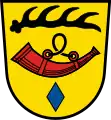 Coat of arms | |
Location of Nürtingen within Esslingen district 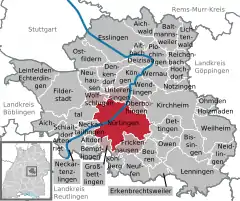 | |
 Nürtingen 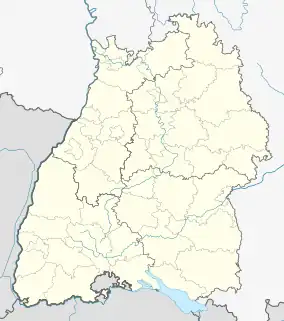 Nürtingen | |
| Coordinates: 48°38′N 9°20′E | |
| Country | Germany |
| State | Baden-Württemberg |
| Admin. region | Stuttgart |
| District | Esslingen |
| Government | |
| • Mayor (2019–27) | Johannes Fridrich[1] |
| Area | |
| • Total | 46.9 km2 (18.1 sq mi) |
| Elevation | 291 m (955 ft) |
| Population (2021-12-31)[2] | |
| • Total | 40,885 |
| • Density | 870/km2 (2,300/sq mi) |
| Time zone | UTC+01:00 (CET) |
| • Summer (DST) | UTC+02:00 (CEST) |
| Postal codes | 72601–72622 |
| Dialling codes | 07022 |
| Vehicle registration | ES, NT |
| Website | nuertingen.de |
History

The following events occurred, by year:
- 1046: First mention of Niuritingin in the document of Speyer. Heinrich III gave Nürtingen as a gift to the chapter of Speyer
- around 1335: Nürtingen received city rights
- 1421: From this date, Nürtingen was the domicile of the Württemberg widows of former sovereigns.
- 1602: The Maientag, a famous folklore procession and celebration, was first recorded
- 1634: Half of the population died in the Thirty Years' War and of the plague
- 1750: 133 buildings were burned down in the great fire
- 1783/1784: Friedrich Hölderlin and Friedrich Wilhelm Joseph von Schelling were pupils of the Latin school (German: Lateinschule). They are still commemorated in the town by the street name Schellingstraße and the name of a high school Hölderlin-Gymnasium.
20th century
During the Nazi era there were in today's urban area 17 forced labor camps and accommodations with "Eastern workers", prisoners of war and "foreign workers", who had to work in the local companies, such as Maschinenfabrik Gebrüder Heller.[3] At the present location of the secondary schools was the Mühlwiesenlager with "Eastern workers". Eleven names of victims of the "euthanasia" murders are known; they were killed in Grafeneck or Hadamar.[4] They also caused that all in so-called "mixed marriages" living men were brought to concentration camps and murdered there.[5][6]
A Sinti child born in Nürtingen, Anton Köhler, was with most of his siblings brought in 1944 from the Catholic orphanage St. Josephpflege in Mulfingen to Auschwitz-Birkenau and killed after his parents had been murdered.[7]
- 1945 : A few bombs hit Nürtingen. The Tiefenbachtal (a valley south of Nürtingen) was an escape route for German soldiers.
- 1948 : The population increased from 10,000 to 17,000 due to refugees and displaced persons from East Germany
- 1973 : The district of Nürtingen was merged into the district of Esslingen


Education
Nürtingen is home to Nürtingen-Geislingen University of Applied Science, also known as the Hochschule für Wirtschaft und Umwelt Nürtingen-Geislingen. The school hosts undergraduate and graduate programs in business administration, finance, real estate, and landscape architecture. Programs are taught in English and German, with a Master of Science in International Finance being taught through its growing European School of Finance, which partners with the German Institute for Corporate Finance, the European Derivatives Institute, the Deutsche Börse, and the Eurex exchange.
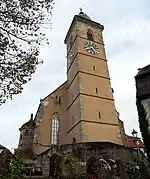
Mayors since 1819
- 1819–1828: Gottlob Friedrich Schickhardt
- 1828–1846: Heinrich Schickhardt
- 1846–1868: Karl Friedrich Eßig
- 1868–1896: Ferdinand Wilhelm Schmid (1829–1896)
- 1896–1930: Matthäus Baur
- 1930–1939: Hermann Weilenmann
- 1939–1943: Walter Klemm (NSDAP)
- 1943–1945: August Pfänder, temporary (NSDAP) (1891–1971)
- 1945–1948: Hermann Weilenmann
- 1948–1959: August Pfänder
- 1959–1979: Karl Gonser (1914–1991)
- 1979–2004: Alfred Bachofer (Free Voters) (born 1942)
- since 2004: Otmar Heirich (SPD) (born 1951)
Districts
Hardt
Hardt (929 inhabitants, as of 2012) is the smallest district of Nürtingen. Hardt was first mentioned in 1366 in documents.
Neckarhausen
Neckarhausen (3,768 inhabitants, as of 2012) is about 2 km from Nürtingen. Neckarhausen was first mentioned in the year 1284. The site is largely dominated by the church and the town hall.
Raidwangen
Raidwangen (2,115 inhabitants, as of 2014) is about 3 km southwest of Nürtingen and about 1 km from the Neckar. Raidwangen was first mentioned in 1236 in documents.
Reudern
Reudern (2,707 inhabitants, as of 2012) is located on a hill approximately 3 km east of Nürtingen and was first mentioned in the year 1338.
Zizishausen
Zizishausen (3,222 inhabitants, as of 2012) is to the left and right of the Neckar and borders to the north directly to the core city of Nürtingen. Zizishausen was first mentioned in 1296.
Oberensingen
Oberensingen (4,060 inhabitants, 2006) closes immediately northwest of the central city of Nürtingen. The first mention dates back to 1344.
Roßdorf
Roßdorf lies south of Nürtingen. The district was created in the early 1960s as a model construction project for modern urban planning on the drawing board. Today Roßdorf has around 4,500 inhabitants.
Local council
The local council in Nürtingen has 32 members. Until 2014, the local council had 39 members. The Baden-Württemberg elections in 2014 had the following results.[8] The Oberbürgermeister (Mayor) is the president of the council and has one vote.
| parties | % 2014 |
Sitze 2014 |
% 2009 |
Sitze 2009 | |
|---|---|---|---|---|---|
| CDU | Christian Democratic Union of Germany | 21.15 | 7 | 23.90 | 10 |
| NL/GRÜNE | Nürtingen list/Alliance 90/The Greens | 16.85 | 5 | 19.53 | 8 |
| FW | Free voters | 15.94 | 5 | 14.43 | 6 |
| SPD | Social Democratic Party of Germany | 13.50 | 4 | 14.18 | 5 |
| NT14 | NT 14 | 11.21 | 4 | — | — |
| LB/FDP | Liberal citizens/Free Democratic Party | 8.67 | 3 | 7.99 | 3 |
| AB | Aktive Bürger | 7.80 | 2 | — | — |
| FWVO | Free voters Nürtingen-Oberensingen | 4.88 | 2 | 5.82 | 2 |
| JB | Young citizens Nürtingen | — | — | 11.32 | 4 |
| REP | The Republicans (Germany) | — | — | 2.47 | 1 |
| gesamt | 100.0 | 32 | 100.0 | 39 | |
| Wahlbeteiligung | 47.62% | 49.75% | |||
Twin towns - sister cities
 Oullins, France
Oullins, France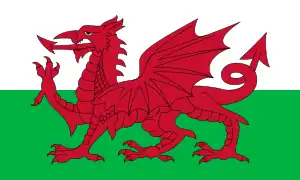 Rhondda Cynon Taf, Wales, United Kingdom
Rhondda Cynon Taf, Wales, United Kingdom Soroksár (Budapest), Hungary
Soroksár (Budapest), Hungary Zerbst, Germany
Zerbst, Germany
Notable people
.JPG.webp)
- Christian Friedrich Duttenhofer (1742–1814), theologian
- Gottlieb Jakob Planck (1751–1833), theologian and church historian, great-grandfather of Max Planck
- Albert Schäffle (1831–1903), scientist and statesman
- Robert Wiedersheim (1848–1923), physician
- Herbert Maisch (1890–1974), theatre director, stage and film director
- Gotthilf Kurz (1923–2010), bookbinder, book artist and graphic artist
- Erwin Waldner (1933–2015), footballer
- Bernd Hoss (1939–2016), football manager
- Klaus Just (born 1964), sprinter
- Alois Schwartz (born 1967), football player and manager
- Markus P. Peters (born 1972), inventor, entrepreneur
- Thomas Brdaric (born 1975), footballer
- Wolf Henzler (born 1975), race car driver
- Christian Gentner (born 1985), footballer
- Dominic Maroh (born 1987), Slovenian footballer
- Matthias Jaissle (born 1988), footballer
- Thomas Gentner (born 1988), footballer
- Daniel Didavi (born 1990), footballer
- Pascal Breier (born 1992), footballer
References
- Aktuelle Wahlergebnisse, Staatsanzeiger, accessed 12 September 2021.
- "Bevölkerung nach Nationalität und Geschlecht am 31. Dezember 2021" [Population by nationality and sex as of December 31, 2021] (CSV) (in German). Statistisches Landesamt Baden-Württemberg. June 2022.
- Steffen Seischab (2011): "Ausländische Zwangsarbeiter", in: Reinhard Tietzen (Hrsg.): Nürtingen 1918–1950. Nürtingen/Frickenhausen: Sindlinger-Burchartz 2011, S. 301 und 317
- Anne Schaude: "Euthanasie"-Morde an Nürtingern, in: Nürtinger Opfer nationalsozialistischer Verfolgung. Webseite der Gedenkinitiative für die Opfer und Leidtragenden des Nationalsozialismus in Nürtingen: ns-opfer-nt.jimdo.com, retrieved 5 November 2013.
- Manuel Werner: Weitere Ermordete. Sich erinnern heißt wachsam bleiben Archived 2016-05-29 at the Wayback Machine, in: Nürtinger Opfer nationalsozialistischer Verfolgung. Website der Gedenkinitiative für die Opfer und Leidtragenden des Nationalsozialismus in Nürtingen: ns-opfer-nt.jimdo.com, retrieved 5 November 2013.
- Manuel Werner: "Die Erinnerung braucht uns, und die Zukunft auch!". Rede von Manuel Werner bei der Übergabe des "Eis der Heckschnärre", in: Nürtinger STATTzeitung
- Manuel Werner (2013): In Nürtingen geboren – in Auschwitz ermordet: Anton Köhler, in: Nürtinger Opfer nationalsozialistischer Verfolgung. Website der Gedenkinitiative für die Opfer und Leidtragenden des Nationalsozialismus in Nürtingen: ns-opfer-nt.jimdo.com, retrieved 5 November 2013.
- Election information of Communal Computer Center Stuttgart
- "Nürtingerinnen und Nürtinger sind in Europa zu Hause". nuertingen.de (in German). Nürtingen. Retrieved 2019-12-04.
External links
- Official website
 (in German)
(in German) - Official Website of University (German & English)